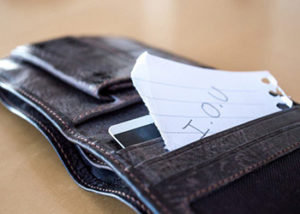
September 9, 2016 – By Megan Elliott

Unpaid debts owed by family, friends, or clients can rankle, and it can be difficult to know what you need to do to get paid. That’s partly because so many people dislike talking about money and prefer to avoid confrontation. They’d rather quietly fume about an unpaid debt than confront the issue head on.
If you’re wondering what do about the money you’re owed, you’re not alone. Half of people who’ve borrowed money from friends and family admit to not paying it back, a survey by iLoan found. Over 70% of freelancers have had trouble getting paid for work they’ve done, a survey by the Freelancers Union found. You may be owed money and not even know it – cable companies, for example, consistently overbill customers and often don’t correct the mistakes unless customers point them out, a U.S. Senate investigation found.
Persistence is key to getting your money back in almost every situation, but the best way to go about collecting your cash depends on who owes you money. Whether you’re dealing with a friend, family member, freelance client, or faceless institution, here are the best ways to get paid and get on with your life.
1. Getting money from a family member
When it comes to loaning money to family, the general advice is to not do it, or if you do, only lend what you’re prepared to lose. In fact, 15% of people said they wouldn’t expect to be paid back if they loaned money to a relative, a survey by American Consumer Credit Counseling found. But what if the money you gave your mother, brother, or cousin really was a loan, and not a gift?
Unless you set up a more formal loan with interest and repayment terms, getting the money back may be difficult. Your family member likely turned to you because they couldn’t get money through a bank or other lender, which means their finances may be shaky, Mary C. Kelly, Ph.D., author of the book Money Smart, told Investopedia.
Being firm about the importance of repayment may spur them into action, and making it easy for them to clear the debt could help too. “Even very small payments can at least get the repayment cycle started if they’re done regularly. That opens up an opportunity to talk about the number of payments, the amount and when they’ll start,” Mark Chatow, attorney at Chatow Law in Newport Beach, California, told Banktrate. But if you’re not careful, insisting a relative pay you back can fracture the relationship. Ultimately, you may need to decide which is more important to you: family or finances.
2. Getting money from a friend
You coughed up $100 to buy concert tickets for you and your best friend, and she hasn’t paid you back yet. Your first move is to ask – politely – for the cash. She may not remember she owes you money. Really. Studies have shown people are not great about recalling how much of a personal loan they’ve repaid. They also underestimate how much it bothers the lender not to be paid back.
If, after a few requests, she still doesn’t come through, you have a choice. You can continue to badger her for the money at the risk of jeopardizing your friendship, or give it up as a lost cause, but resolve not to be so free with the loans in the future. The next time a friend needs you to cover for them, consider using a tool like Venmo, which lets you remind people they owe you money without all the awkwardness of a face-to-face chat. And if you’re considering a bigger loan, make sure you put everything in writing if you ever hope to see your cash again.
3. Getting money from a client
Side hustles are the norm these days, as people set up shop as freelance graphic designers, pet sitters, jewelry makers, and yoga instructors to make extra cash. Running your own business can be an excellent way to pad your income, but it comes with risks, as anyone whose ever been stiffed by a client knows. About half of all freelancers experienced problems collecting a payment in the last year, the Freelancers Union found.
Before you hang your shingle, have a plan for how you’ll get delinquent clients to pony up. An organized accounting system will help you spot payment slackers right away, while templated reminder letters can be sent out according to a schedule, Rieva Lesonsky CEO and cofounder of GrowBiz Media, wrote in an article for American Express OPEN. If that’s not enough to put a check in the mail, get on the phone and try to work out a payment plan. Keep your cool, but if the money still isn’t forthcoming, you might need to consider hiring a collection agency or pursuing legal action.
4. Getting money from a faceless corporation
Overcharged by your cable company? Waiting on refund due to a billing error? Upset about erroneous overdraft fees? You may be able to get your money back from the faceless corporation that owes you.
Contacting customer service is the first step to getting paid. Sometimes, a simple conversation or firmly worded letter accompanied by documentation is enough to get the situation resolved. If that doesn’t work, you have a few options. Some people have found success voicing their frustrations in public. Shaming the company on Twitter or reaching out to the local media may prompt them to pay up. In other cases, legal action can get you what you want; this Consumerist reader has gotten thousands of dollars from companies that owed him money by taking them to small claims court.
